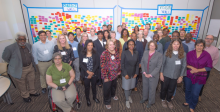
PROJECTS OVERVIEW
The South Big Data Innovation Hub supports large and small scale projects, from $1,000 - $1 million, aimed to increase the efficiency and effectiveness of knowledge and technology transfer between individuals, universities, public and private research centers and laboratories, large enterprises, and small and medium-sized businesses.
Each Data Innovation Project will work on a challenge that requires data science ideas, approaches, and solutions. By taking on a convening and synergizing role, as opposed to directly conducting new research, the six Data Innovation Projects, called “Spokes,” will each gather important stakeholders, engage end users and solution providers, and form multidisciplinary teams to tackle large questions no single field can solve alone. However, unlike the Hubs, which aim to span the full range of data-driven challenges and solutions in a geographic region, each Spoke will have a specific, goal-driven mission.
Seed grant projects are designed to give money to PI’s to establish communities of practise, working groups, or provide a connection point between two or more communities, sectors, or solution providers to grow and scale opportunities for the Southern region. .
PROJECTS IMPACT
- $6M+ in funding for large-scale Spoke Projects that impact the Southern region
- $250k per year available for Seed Grant funding
The South Hub supported Data Innovation Projects - Spokes and Seed Grants - are listed below











